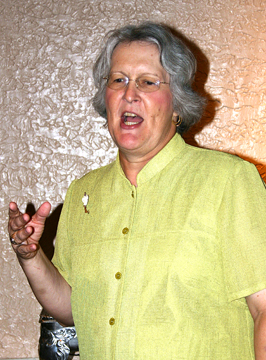Back when I was in junior high school — the early to mid 1970s — our school had a dress code that prohibited girls from wearing pants with rear pockets. See, pants that had pockets on the back were “boy” pants, and girls weren’t allowed to wear “boy” pants.
Having always been a jeans kind of gal myself, I broke that rule often. And I got in trouble for it more than once.
But obviously, my rural, smalltown junior high school wasn’t the only place that had such rules. Most cities had ordinances that prohibited cross-dressing. My old friend, the late Joe Elliott, told me that in the ’60s when she was a dyke about town, the butch lesbians always had to be careful not to dress too masculine in public, or they would be arrested. And I have heard drag queens talk about how they had to make sure to wear men’s underwear under their dresses to avoid arrest.
These ordinances were usually used by police to justify harassment of “the queers,” especially the transgenders and the butch lesbians. Such was the case in Houston, where next weekend the Transgender Foundation of America will hold an event to celebrate the 30th anniversary of the repeal of that city’s “no cross-dressing” ordinance.
Lou Weaver, who is on the TFA board, sent out an e-mail Wednesday announcing the event.
“This is not a joke!” Weaver wrote. “At that time women were expected to have their zippers on the side or in the back, otherwise, they were cross-dressing. This led to constant harrassment and several arrests for trans identified women, lesbians and anyone else the vice squad did not approve of.”
Well-known Houston attorney transgender activist Phyllis Frye led the three-and-a-half-year-long battle to get the ordinance repealed, and she will be on hand at the event to “share stories about fighting for transgender rights,” Weaver said. One of those stories is Frye’s account, following, about how they slipped the repeal vote past the homophobes/transphobes:
“On August the 12th, 1980, after several delay-tags that were put on to the repeal ordinance, it was again before Council. At the time, our Mayor was Jim McConn. He was out of town, as was Jim Westmoreland. McConn knew that it was coming up on the agenda, and he had told the Mayor pro tem for that day, Johnny Goyen, that it was alright with him. City Secretary, Anna Russell, waited until Council members Homer Ford and Larry McKaskell were on the phone. When they got on the phone, she immediately handed the repeal to Johnny. You see, the deal is that under council rules if you’re present and you don’t vote no, then it’s an automatic yes vote. Homer and Larry were on the phone. They didn’t even know what was going on. There was only one no vote, and that was Council member Christen Hartung, she was the sole and only no vote. I still hope that somebody will beat her. Homer and Larry went to Johnny about five minutes later, and Johnny says, ‘oh, I didn’t know that was going through.’ The ordinance was repealed and it has remained so to this day.”
The anniversary event will be held from noon to 5 p.m. on Saturday, Aug. 14, at 604 Pacific in Houston. Everyone is welcome. Food will be provided but bring your own beer and wine.
Today, we celebrate a court victory over Prop 8 in California and move one step closer to eventual full marriage equality in this country. But as you celebrate remember that just 30 years ago, butch lesbians in Houston couldn’t wear zip-up Levis without risking arrest.
So if you are in Houston next weekend, go on over to 604 Pacific on Saturday afternoon and celebrate a significant historical victory. And if you’re not in Houston, well, take a minute that day to stop and say a silent thank-you to those men and women, like Phyllis, who were willing to stand up and fight the good fight when it was much more dangerous to do so, and win the battles that make it possible for us to live as openly and freely as we do today.















When I was a teenager, I remember dancing at a gay underage club in Ft Worth and hearing about a debate on similar laws in Dallas. Everybody in Ft Worth was happy not to be in Dallas or Houston. It must have been hard to grow up gay in such an atmosphere.
Wow, that was an actual ordinance?! My god, people like to come up with the stupidest laws to ban the stupidest things.